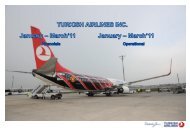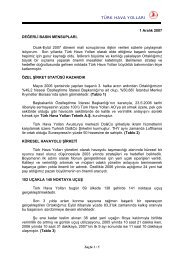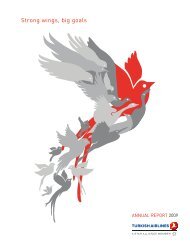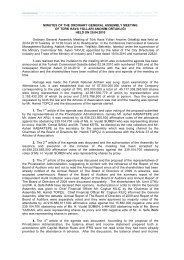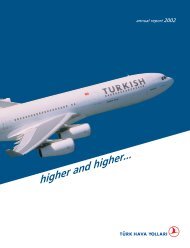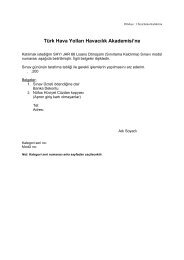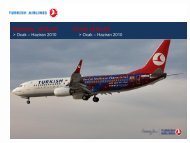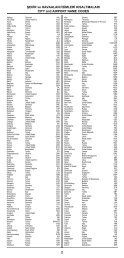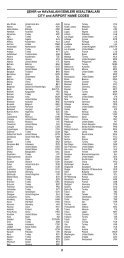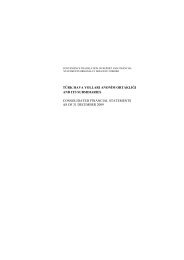2003 Annual Report - Turkish Airlines
2003 Annual Report - Turkish Airlines
2003 Annual Report - Turkish Airlines
Create successful ePaper yourself
Turn your PDF publications into a flip-book with our unique Google optimized e-Paper software.
Initiatives to Lower Expenses/Call CenterThe Call Center reorganized and redesigned accordingto changing economic conditions is now able to offer agreater variety of services, capacity and quality. To offerits customers better service, <strong>Turkish</strong> <strong>Airlines</strong> moved its stafffrom other branches to the Call Center. It has closeddown Call Centers in Izmir and Ankara and redirecting itsstaff to the Call Center in Istanbul in an effort tostandardize services. The explanations menu (444 0 THY- 444 0 849) has been simplified, working conditions forthe Call Center staff have been improved and investmentshave been made for state-of-the-art technology. TheCenter’s capacity was upgraded from 40 trunks to 45trunks as of July 8, <strong>2003</strong>. In order to support the CallCenters assigned to existing offices both in the US andEngland, <strong>Turkish</strong> <strong>Airlines</strong> has redirected calls originatingin these countries to the Istanbul Center.Based on initial results after the application of theaforementioned changes, the number of answered callshas doubled even as the number of incoming calls hasincreased.Effective Crisis ManagementThe airline industry was shaken by crises in <strong>2003</strong>. Thewar in Iraq, so close to Turkey and the SARS epidemic,originating in the Far East that subsequeutly became aglobal crisis, had negative effects on all airlines duringthe first half of the year. <strong>Turkish</strong> <strong>Airlines</strong> took precautionsto minimize the damage as it anticipated what couldhappen worst and exercised effective crisis managementtechniques. During the war in Iraq, <strong>Turkish</strong> <strong>Airlines</strong>cancelled flights to many destinations in the Middle East,avoiding empty flights and minimizing loss. In that period,848 international and 1,850 domestic flights wereterminated. Similarly, flights on the routes most intenselyaffected by SARS were also cancelled; between April 16and June 30, <strong>2003</strong> Hong Kong flights stopped andbetween May 14 and July 15 the Beijing/Shanghaiflights did not take place.During the ensuing crisis period caused by the Iraq warand SARS epidemic, <strong>Turkish</strong> <strong>Airlines</strong> implemented aproactive strategy by canceling flights on low-incomeroutes and channeling the existing capacity to routes witha higher rate of return. This strategy was structured attimes by employing temporary flight cancellations andadding extra flights or by increasing or decreasingfrequency; at other times the strategy was to reorganizethe schedule according to customer demand. As a result,on routes where an expansion capacity was employed,there was an average increase of 50% in income perlanding with respect to the previous routes on which thementioned capacity was used; the unit income value22



